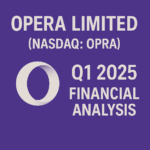Airbnb, Inc. (NYSE: ABNB)
Q1 2025 Financial Analysis | May 1, 2025
Executive Summary
Airbnb reported solid but moderate growth in Q1 2025, with revenue increasing 6% year-over-year to $2.3 billion (8% excluding FX impacts). The company achieved 143.1 million Nights and Experiences Booked, up 8% year-over-year, and Gross Booking Value (GBV) of $24.5 billion, a 7% increase (9% excluding FX). While operating income decreased to $38 million from $101 million in the prior year, primarily due to increased investments in product development and higher stock-based compensation, Airbnb maintained profitability with net income of $154 million (7% margin) and Adjusted EBITDA of $417 million (18% margin).
Q1 2025 Highlights
Financial Performance
Airbnb’s Q1 2025 revenue grew 6% year-over-year to $2.3 billion, or 8% when excluding the impact of foreign exchange (FX) fluctuations. This growth was primarily driven by strong performance in Nights and Experiences Booked, which increased 8% year-over-year to 143.1 million. Growth was partially offset by calendar factors, specifically the timing of Easter in Q1 2024 versus Q2 2025 and the inclusion of Leap Day in Q1 2024, which created a challenging comparison. When excluding these calendar effects, revenue growth would have been approximately 11% year-over-year.
Net income decreased to $154 million (7% margin) in Q1 2025 from $264 million (12% margin) in Q1 2024, representing a 42% decline. This decrease was primarily driven by higher stock-based compensation expense related to increased headcount, one-time write-downs of certain investments in privately-held companies, and lower interest income. Operating income declined to $38 million from $101 million in the prior year period, reflecting significant investments in product development ahead of the company’s upcoming “Summer Release” on May 13, 2025.
Adjusted EBITDA was $417 million (18% margin) in Q1 2025, a slight decrease from $424 million (20% margin) in Q1 2024. This decline was primarily due to Q1 2024 revenue benefiting from the calendar factors described above, as well as increased investments in product development. Despite the year-over-year decrease, Adjusted EBITDA margin remained healthy at 18%, demonstrating the company’s strong underlying profitability.
Free Cash Flow was $1.8 billion in Q1 2025, representing a Free Cash Flow Margin of 78%. This represented a slight decrease from $1.9 billion in Q1 2024, primarily driven by the decline in net income. Despite this modest decrease, Airbnb continues to demonstrate exceptional cash flow generation, with Trailing Twelve Month (TTM) Free Cash Flow of $4.4 billion, representing a TTM FCF Margin of 39%.
The company continued its share repurchase program, buying back $807 million of Class A common stock during Q1 2025. This contributed to a reduction in the fully diluted share count from 677 million at the end of Q1 2024 to 660 million at the end of Q1 2025, a decrease of approximately 2.5%.
Key Business Metrics
| Metric | Q1 2025 | Q1 2024 | YoY Change |
|---|---|---|---|
| Nights and Experiences Booked | 143.1M | 132.6M | +8% |
| Gross Booking Value (GBV) | $24.5B | $22.9B | +7% |
| GBV (ex-FX) | $24.5B | $22.5B | +9% |
| Average Daily Rate (ADR) | $171 | $173 | -1% |
| ADR (ex-FX) | $171 | $169 | +1% |
Nights and Experiences Booked increased 8% year-over-year to 143.1 million in Q1 2025, despite the challenging comparison to Q1 2024, which included Leap Day. This growth reflects the continued strength of the Airbnb platform and the company’s ability to attract both guests and hosts. Growth continued to be driven by the company’s app strategy, with nights booked on the Airbnb app increasing 17% year-over-year and app bookings accounting for 58% of total nights booked, up from 54% in Q1 2024.
Gross Booking Value (GBV) increased 7% year-over-year to $24.5 billion, or 9% excluding FX impacts. GBV growth was slightly below Nights and Experiences Booked growth due to a modest decline in Average Daily Rate (ADR), which decreased 1% year-over-year to $171. However, when excluding the impact of FX, ADR increased 1% and was up across all regions, largely due to price appreciation.
Average Daily Rate (ADR) dynamics varied by region, with North America experiencing a 2% increase in ADR during Q1 2025, driven by price appreciation. Europe, Middle East & Africa (EMEA) saw a 2% increase in ADR (4% ex-FX), while Latin America experienced a 7% decrease in ADR, primarily driven by FX impacts. On an ex-FX basis, ADR in Latin America increased 2%. In Asia Pacific, ADR declined 1% (increased 3% ex-FX).
Travel trends remained relatively consistent in Q1 2025 compared to the prior year period in terms of market type, travel corridor, and length of stay. Average lead times on the platform were generally stable year-over-year. The company continued to see demand growth in North America despite broader economic uncertainties, with the vast majority of nights booked in the U.S. coming from domestic travelers.
Supply growth remained healthy, with active listings increasing at a pace approximately in line with Nights and Experiences Booked. The company’s supply growth strategy continues to focus on targeted acquisition in supply-constrained markets, improving calendar availability for existing hosts, and removing low-quality listings to enhance the guest experience. In Q1 2025, nights booked at listings managed by Superhosts increased 15% year-over-year, indicating the value of quality listings to the platform.
Geographic Performance
| Region | Growth in Nights & Experiences Booked | Key Trends |
|---|---|---|
| North America | Low-single digits | Continued demand despite economic uncertainty; U.S. dominated by domestic travel |
| EMEA | Mid-single digits | Continued price appreciation; mix shift toward short-term stays |
| Latin America | Low 20s | Brazil grew 27% in Q1; first-time booker growth exceeded 30% |
| Asia Pacific | Mid-teens | Japan saw double-digit growth in domestic bookings (>20% YoY) |
North America saw low-single digit growth in Nights and Experiences Booked in Q1 2025 compared to Q1 2024. Despite broader economic uncertainties, demand continued to grow year-over-year in this region. The vast majority of nights booked in the U.S. were by domestic travelers, with only a single-digit percentage of global nights booked representing international inbound travel to the U.S. While Canadian travel to the U.S. showed some softness at the end of Q1, Canadian guests continued to use Airbnb for other destinations, with bookings by Canadian guests to destinations in Mexico increasing 27% year-over-year in March.
Europe, Middle East & Africa (EMEA) experienced mid-single digit growth in Nights and Experiences Booked during Q1 2025. ADR in the region increased 2% year-over-year (4% ex-FX), driven by a combination of continued price appreciation and mix shift. Growth in short-term stays and entire homes continued to outpace longer-term stays and Airbnb rooms, helping to drive the mix shift.
Latin America remained the fastest-growing region for Airbnb, with Nights and Experiences Booked growing in the low-20s percentage range in Q1 2025. Brazil in particular showed exceptional performance, with origin nights booked growing 27% in Q1 2025, an acceleration from Q4 2024. First-time booker growth also picked up sequentially, exceeding 30% in Q1 2025. To better meet the needs of guests in this market, Airbnb introduced a local payment method called Pix last year, which led to an uplift in bookings and first-time bookers.
Asia Pacific delivered mid-teens growth in Nights and Experiences Booked in Q1 2025. The company saw particularly encouraging results in Japan, where both first-time bookers and domestic nights booked increased double digits, with domestic bookings growing over 20% year-over-year. These results followed a brand campaign launched last year to raise awareness of Airbnb among Japanese travelers.
Airbnb’s geographic expansion strategy continues to show success, with international markets driving both user growth and increasingly significant revenue contributions. The company remains focused on making Airbnb locally relevant in each market, with strategies tailored to regional needs including product localization, locally relevant marketing campaigns, and market-specific payment methods.
Operating Margins & Profitability
Airbnb’s profitability metrics for Q1 2025 showed some pressure compared to Q1 2024, primarily due to increased investments in product development and higher stock-based compensation expenses:
- Operating Income: Decreased to $38 million (1.7% margin) from $101 million (4.7% margin) in Q1 2024, primarily due to higher expenses across product development, sales and marketing, and operations
- Net Income: Declined to $154 million (7% margin) from $264 million (12% margin) in Q1 2024, affected by higher stock-based compensation, investment write-downs, and lower interest income
- Adjusted EBITDA: Slightly decreased to $417 million (18% margin) from $424 million (20% margin) in the prior year period
- Free Cash Flow: $1.8 billion (78% margin) compared to $1.9 billion (89% margin) in Q1 2024
The year-over-year decline in profitability was driven by several factors. First, calendar effects, including the timing of Easter and Leap Day in Q1 2024, created a challenging year-over-year comparison. Second, the company increased investments in product development ahead of its May 13th “Summer Release,” which is expected to introduce new offerings beyond accommodations. This strategic investment increased Product Development expenses by 19.6% to $568 million in Q1 2025 compared to $475 million in Q1 2024.
Stock-based compensation expense increased to $358 million in Q1 2025 from $295 million in Q1 2024, representing a 21.4% increase. This growth was primarily driven by increased headcount to support the company’s strategic initiatives. Sales and marketing expenses also rose by 9.5% to $563 million, reflecting increased marketing investments ahead of the Summer Release.
Despite these increased investments, Airbnb maintained strong profitability with an Adjusted EBITDA margin of 18% and Free Cash Flow margin of 78%. This demonstrates the company’s highly scalable business model and ability to generate substantial cash flow even while investing for future growth. The company’s trailing twelve-month Free Cash Flow reached $4.4 billion, representing a TTM FCF margin of 39%.
Management reaffirmed its full-year 2025 Adjusted EBITDA margin guidance of at least 34.5%, indicating confidence in maintaining strong profitability while making meaningful investments in future growth initiatives. The company plans to invest $200-250 million in launching and scaling new businesses in 2025, with the impact of these investments on quarterly Adjusted EBITDA margin expected to be most pronounced during the second half of the year when these new offerings are introduced.
Balance Sheet & Cash Position
Airbnb maintains an exceptionally strong balance sheet, providing significant financial flexibility to invest in growth opportunities and return capital to shareholders:
- Cash and Investments: $11.5 billion in cash and cash equivalents, short-term investments, and restricted cash as of March 31, 2025
- Funds Receivable and Amounts Held on Behalf of Customers: $9.2 billion, representing customer deposits not yet recognized as revenue
- Total Assets: $25.1 billion, up from $21.0 billion at December 31, 2024
- Total Liabilities: $17.1 billion, including $2.0 billion in long-term debt (reclassified as current)
- Stockholders’ Equity: $7.9 billion, down slightly from $8.4 billion at December 31, 2024
The company’s robust cash position was supported by strong cash flow generation in Q1 2025, with net cash provided by operating activities of $1.8 billion and Free Cash Flow of $1.8 billion. This cash flow performance highlights the capital-light nature of Airbnb’s business model, with minimal capital expenditures of just $8 million during the quarter (less than 1% of revenue).
Airbnb continued its share repurchase program, buying back $807 million of Class A common stock during Q1 2025. Since the inception of the share repurchase program in Q3 2022, the company’s fully diluted share count has decreased by approximately 6%, driven by share repurchases and cash used for employee tax obligations totaling $10.3 billion. As of March 31, 2025, the company had $2.5 billion remaining under its $6 billion repurchase authorization.
The company’s strong balance sheet and significant cash flow generation provide it with the flexibility to pursue its capital allocation priorities: investments in organic growth, strategic acquisitions when relevant, and returning capital to shareholders. This financial strength positions Airbnb well to weather potential economic uncertainties while continuing to invest in strategic initiatives that will drive long-term growth.
Q2 2025 and Full-Year Outlook
For Q2 2025, Airbnb provided the following guidance:
- Revenue expected to be in the range of $2.99 billion to $3.05 billion, representing year-over-year growth of 9% to 11%
- Year-over-year growth of Nights and Experiences Booked expected to moderate relative to Q1 2025
- ADR expected to be approximately flat year-over-year
- Adjusted EBITDA expected to increase on a year-over-year basis
- Adjusted EBITDA Margin expected to be flat to down slightly compared to Q2 2024
The Q2 2025 revenue guidance includes a benefit of approximately two percentage points related to the timing of Easter in 2024, which creates a favorable year-over-year comparison during the quarter. Marketing expense is expected to grow faster than revenue on a year-over-year basis in Q2 2025, partially due to the company’s “Summer Release” and investments in new growth initiatives.
For full-year 2025, the company reaffirmed its prior guidance of delivering a full-year Adjusted EBITDA Margin of at least 34.5%, maintaining its strong track record of profitability while making meaningful investments in future growth. As shared in its prior shareholder letter, Airbnb plans to invest $200-250 million toward launching and scaling new businesses in 2025, which will be introduced on May 13.
Management expressed confidence in Airbnb’s ability to deliver strong results despite recent global economic volatility. The company believes its model is inherently adaptable to periods of consumer uncertainty, offering guests a wide range of listings around the world at every price point, from budget to luxury, and providing hosts with a valuable way to earn extra income.
The company highlighted that May 13, 2025, will be a significant milestone as Airbnb plans to “go beyond places to stay” with its Summer Release, potentially expanding into new service offerings. This expansion is expected to build on the groundwork the company has been laying for years, including rebuilding the Airbnb app on a new technology stack that can support entirely new offerings beyond accommodations.
Strategic Initiatives
Airbnb’s strategic initiatives focus on driving long-term growth and preparing for its next chapter of expansion beyond accommodations:
- Summer Release: On May 13, 2025, Airbnb will unveil new offerings that go “beyond places to stay,” representing a significant expansion of the company’s business model
- App Infrastructure: The company has spent the past few years rebuilding the Airbnb app on a new technology stack that can support entirely new offerings beyond accommodations
- Core Service Improvements: Continued focus on enhancing the core accommodation service through hundreds of upgrades that have made Airbnb easier to use, more reliable, and more affordable
- Quality Listings: Since launching its updated hosting quality system in 2023, Airbnb has removed over 450,000 low-quality listings and has seen a reduction in customer service issue rates and credit card chargeback rates
- Guest Favorites: This feature has helped guests more easily find high-quality accommodations, with over 350 million nights booked at Guest Favorite listings since launch
- Superhosts: Nights booked at listings managed by Superhosts increased 15% year-over-year in Q1 2025, highlighting the value of quality offerings
- Calendar Availability: Initiatives to help existing hosts accommodate more guests, including the Co-Host Network launched last year
The company has also been focused on making incremental improvements that deliver significant impact. These include developing algorithms for personalized filter recommendations in the booking flow, adding contextual tips to help travelers get better value and book before time runs out, and simplifying the checkout process to reduce drop-offs.
Airbnb’s “Get an Airbnb” marketing campaign continues to highlight the unique advantages of choosing Airbnb over traditional hotels. The latest commercial emphasizes how Airbnb unlocks stays that go beyond the four walls of a traditional hotel room, showcasing how guests can open their door to experiences like a forest rather than just a hotel lobby.
The company’s adaptable business model continues to be a key strategic advantage. With millions of homes in neighborhoods and cities worldwide, guests can find stays at every price point from budget to luxury. This flexibility allows Airbnb to adapt to changing consumer preferences and economic conditions, as it has demonstrated since its founding during the Great Recession through its IPO during the pandemic.
Risks & Opportunities
Opportunities
Risks
Conclusion
Strengths
- Strong booking growth (8% increase in Nights and Experiences Booked)
- Robust international expansion, particularly in Latin America and Asia Pacific
- Exceptional cash flow generation ($1.8B FCF, 78% margin)
- Solid balance sheet with $11.5B in cash and investments
- Continued focus on quality listings and guest experience
Areas to Monitor
- Declining profitability metrics (net income down 42% YoY)
- Increased investments in product development ahead of Summer Release
- Softening demand in North America due to economic uncertainty
- ADR pressure due to FX headwinds
- Execution risk of expansion beyond accommodations
Summary
Airbnb delivered a solid Q1 2025 with moderate revenue growth of 6% year-over-year (8% ex-FX) to $2.3 billion, driven by an 8% increase in Nights and Experiences Booked. While profitability metrics declined year-over-year, primarily due to increased investments in product development and higher stock-based compensation, the company maintained strong cash flow generation with $1.8 billion in Free Cash Flow (78% margin).
The company’s performance was impacted by challenging comparisons due to calendar effects, including the timing of Easter and the inclusion of Leap Day in Q1 2024. When excluding these factors, revenue growth would have been approximately 11% year-over-year. Geographic performance varied, with Latin America showing exceptional growth in the low-20s percentage range, Asia Pacific growing mid-teens, and North America delivering low-single digit growth despite economic uncertainties.
Looking ahead, Airbnb’s May 13th “Summer Release” represents a pivotal moment for the company as it plans to expand beyond accommodations into new offerings. This expansion, while creating short-term margin pressure due to increased investments, positions the company for potential long-term growth by diversifying its revenue streams. With a strong balance sheet, robust cash flow generation, and an adaptable business model, Airbnb is well-positioned to navigate the evolving travel landscape and continue its growth trajectory.
Source: Airbnb Q1 2025 Earnings Release






